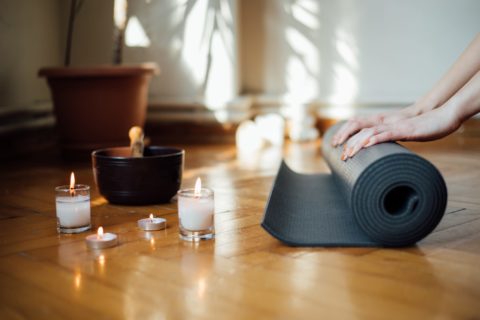An Incredibly Simple Guide to Staying Healthy This Holiday Season
These tips are expert-approved.
The holidays are here, which means taking a few days to unwind and catch up with loved ones. It may also mean decadent feasts, a step count that brings upon shame, and stress/exhaustion. If reading this is already stressing you out, don’t sweat it. Here, an uncomplicated and incredibly simple guide to staying healthy during the holidays and enjoying the most wonderful time of the year.
Try to actually enjoy your food
We get it: The carb- and sugar-heavy options at a traditional Christmas spread tend to induce strong bouts of anxiety, especially if you’re a diligent meal planner.
However, if there’s one time during the year to cut yourself some slack it’s now. Toronto-based dietician Abby Langer suggests not putting pressure on yourself to adhere to a strict diet or avoid certain dishes. “If there are foods that you really love and only get once a year then enjoy them,” she says. By not setting food restrictions, you’ll be able to avoid the vicious cycle of overeating, feeling terrible about yourself immediately after, overexercising to compensate for overeating and sometimes eating even more for the calories you’ve just burned off. “It just ends up backfiring in the end,” Langer says.
What you do want to consider are the food options available. If the feast is being served family- or buffet-style, Langer suggests examining what’s on the menu before loading up your plate. This will allow you to pick out the foods you really love versus those you can easily pass up. Another rule of thumb is to prioritize protein and veggies first, then dig into the carbs. In the end however, Langer reminds us that overeating once or twice during a single week in a year won’t do damage to your health. “People get so hung up on what they eat and it really destroys the whole meaning of the holidays, which is not just food, but the company you’re with.”
Stick to fool-proof workouts
There may not be a single boutique fitness studio in sight if you’re spending the holidays in the country, but this shouldn’t stop you from NOT moving your body for at least a couple of minutes. According to Health Canada, adults should be getting 150 minutes of exercise per week, which averages to 20 minutes per day.
If you’re lucky enough to have access to a treadmill, hop on it for a brisk walk while tuning in to your favourite podcast or a motivating playlist. Travelling? Consider packing compact equipment, like a set of mini bands or core sliders, that you can easily toss in your weekender. If you need guidance through your sweat sessions (we don’t blame you), there’s no shortage of workout apps (Nike Training Club, Sweat) and at-home videos (like MISFITSTUDIO’s workout video series) available. There are also fun tech toys, like Nintendo’s RingFit Adventure for the Switch console, which includes a hand-held ring similar to a Pilates wheel that you hold while performing various exercises, from squats to bridge inner thigh squeezes that mimic even the toughest of Studio Lagree classes (minus the actual megaformer).
Don’t forget to breathe, and most importantly, rest
The holidays are a stressful time of year (last-minute shopping, anyone?), and stress can take a toll on your mental and physical well-being. That’s why setting aside some alone time for yourself is crucial.
Enter: Meditation. Aside from its multiple health benefits, like decreasing blood pressure and improving sleep, meditation can help create a sense of calm throughout your day. “It also doesn’t always have to be an elaborate process,” says Chanel Wolf, a meditation expert and breathwork facilitator who splits her time between Toronto and Los Angeles. “It can be as simple as waking up and choosing to focus on your breath for five minutes, rather than grabbing your phone and scrolling through social media.” If the idea of meditating in bed is non-appealing to you, find a quiet and comfortable space in your room or home where you zen out. Wolf suggests incorporating scents into your routine to help set the tone (think: essential oils, scented candles, incense) and keeping a journal nearby where you can jot down things you’re thankful for. “Research has shown that practicing gratitude has extremely positive effects on our brain and our physical health.”
Also important is sleep. In the age of being booked-and-busy it’s incredibly easy to dismiss this basic human function; it’s recommended that adults get between 7 to 9 hours of rest. However, if you’re part of the 55 per cent of Canadian women who have trouble going to sleep or staying asleep, you may want to tweak your pre-bedtime rituals. For starters, you can limit your exposure to blue light—short wavelength light emitted by electronic devices that suppresses the release of melatonin in your body—by avoiding screen time at least two hours before bed. Tip: Many phones nowadays come with built-in night shift and blue light filter options. If that doesn’t help, you’re never too old for a bedtime story. Apps like Calm and Relax Melodies offer bedtime story audios, read and narrated by the most soothing of voices, which will have you snoozing in no time.












